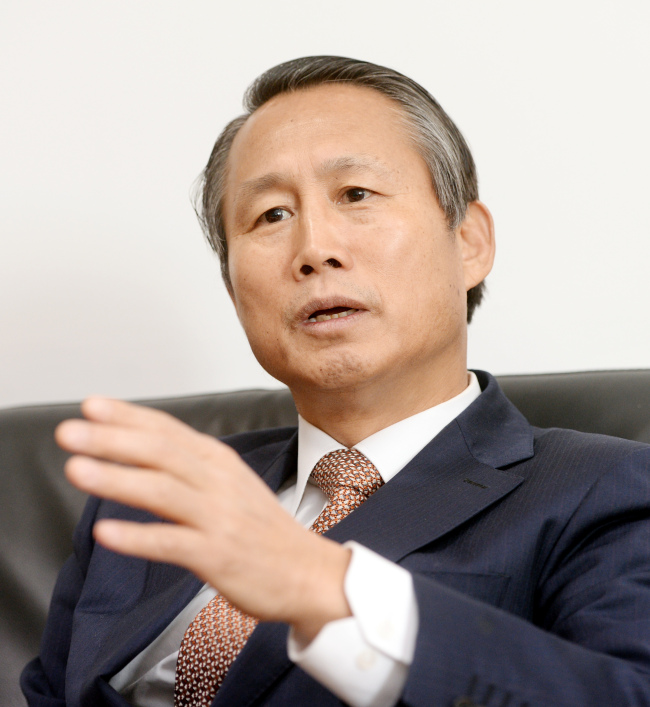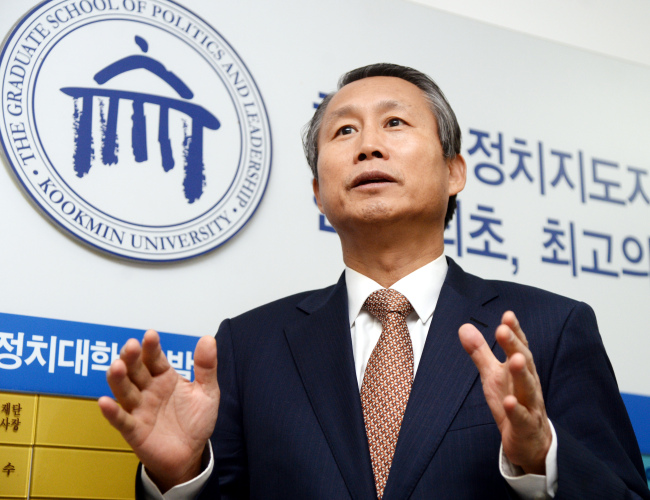'US could have a surprise deal with NK'
이 글자크기로 변경됩니다.
(예시) 가장 빠른 뉴스가 있고 다양한 정보, 쌍방향 소통이 숨쉬는 다음뉴스를 만나보세요. 다음뉴스는 국내외 주요이슈와 실시간 속보, 문화생활 및 다양한 분야의 뉴스를 입체적으로 전달하고 있습니다.
US President Donald Trump could strike a surprise deal with North Korea over its nuclear program, while adopting a more hawkish policy toward China, Pyongyang’s main ally, said Park Hwee-rhak, the dean of the graduate school of politics and leadership at Kookmin University.
The most concerning situation, he said, is that Washington might acknowledge Pyongyang’s current nuclear capability in exchange for getting the reclusive regime to agree to stop building nukes capable of hitting the US continent.
“We are in a very difficult position if the US strikes a deal with North Korea to give Pyongyang the right to have existing nuclear capability. Washington might favor the deal if there is a guarantee that the nuclear missile will not target them,” he said in an interview with The Korea Herald.
“I think (Trump) is willing to negotiate with anyone as long as he believes they can see eye-to-eye,” Park said, adding that Trump’s remark about meeting with North Korea’s leader Kim Jong-un over hamburgers for a talk is “not political rhetoric, but something that shows the personality” of the new US president.

In October last year, former US Secretary of Defense William Perry said Washington should try negotiations with Pyongyang first to stop it from further pursuing its nuclear program and put a moratorium on its current nuclear capability.
Park stressed that South Korea should enhance its security alliance with the US and make clear that the US is its top priority partner -- over China -- when it comes to security issues. China has been taking retaliatory steps to pressure South Korea to give up its planned installment of an US-led anti-missile system, called the Terminal High Altitude Area Defense.
He predicted that North Korea’s evolving nuclear program would be the most likely point of disagreement between the US and China in Northeast Asia, and Washington will face rising challenges from Pyongyang and Beijing, which could act separately or together.
Using an analogy of a “game of chicken” to describe the possible confrontation between China and the US over North Korea, the professor argued the new US leader could win, because he comes across as irrational, having been under fire for controversial remarks and unpredictable behavior.
“Many people believe that China has leverage over the US because they are major creditors of US debt. But I think Trump sees it the other way around. He believes that he has a card he can play against China because, after all, the US is the biggest market for China.”
The professor predicted that Pyongyang would continue to pursue its nuclear ambitions, prompting Washington to enhance its military alliance with Seoul and even consider military options to take out North Korean nuclear facilities.

But the preventive attack is a risky option and would be a last resort when there are no viable options left, Park noted, because North Korea has already obtained nuclear capability that can target US bases in South Korea and Japan.
“I don’t think Trump would seek a military option at first. He would start from economic sanctions and try negotiations afterward. If all the options don’t work out, he will leave open the possibility of taking military actions. He needs to take time because it is too risky,” he said.
For South Korea to avoid confrontation with regional powers amid mounting criticism from China over Seoul’s decision to deploy the THAAD, policymakers need to shift from taking an ambiguous position between Washington and Beijing and focus more on enhancing security alliance with the US, Park said.
“The reason we suffer damage from China is not because of the position we take, but because of the ambiguity of our position. If we had made clear we are on the US side on security matters, China never would have challenged our decision,” he said.
By Yeo Jun-suk (jasonyeo@heraldcorp.com)
<ⓒKoreaHerald(www.koreaherald.com)무단전재 및 재배포 금지>
Copyright © 코리아헤럴드. 무단전재 및 재배포 금지.